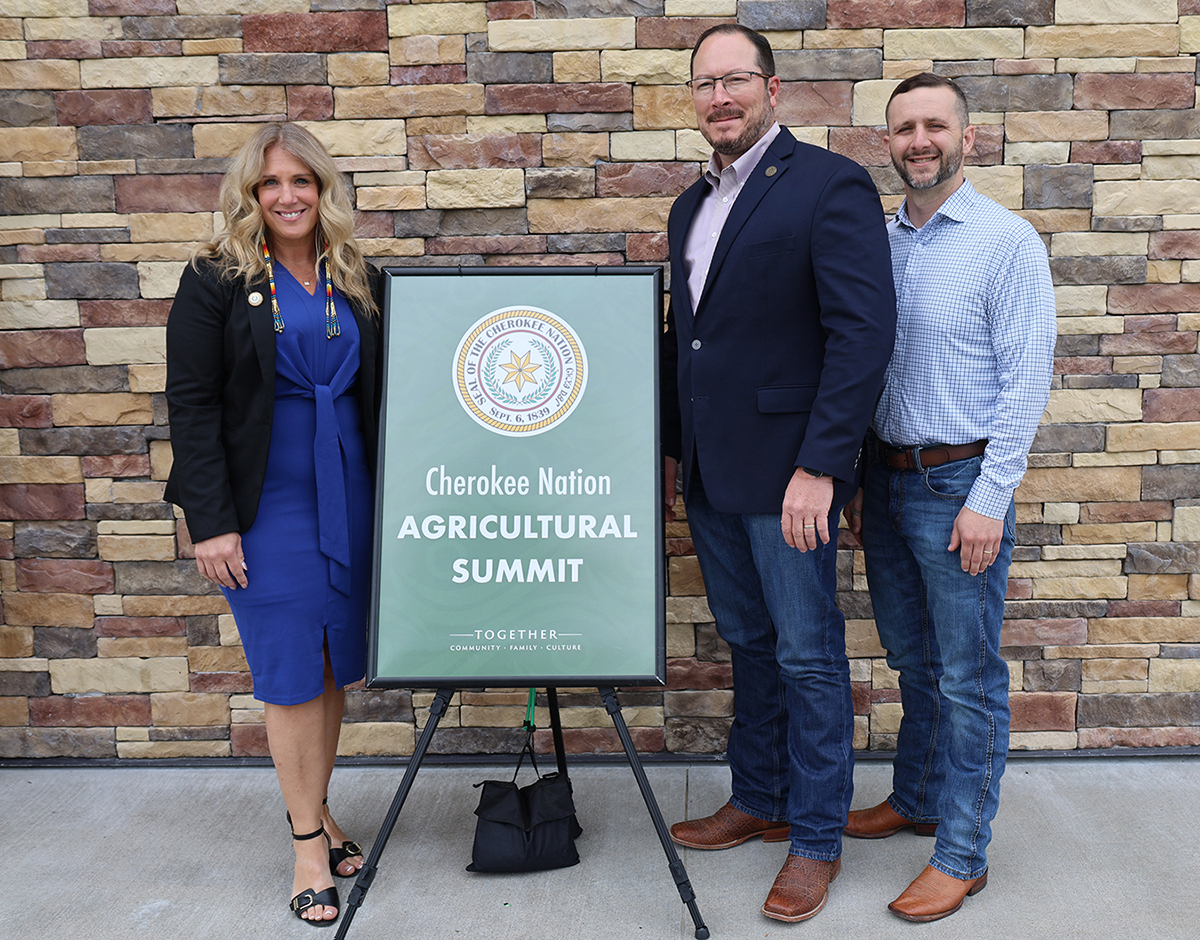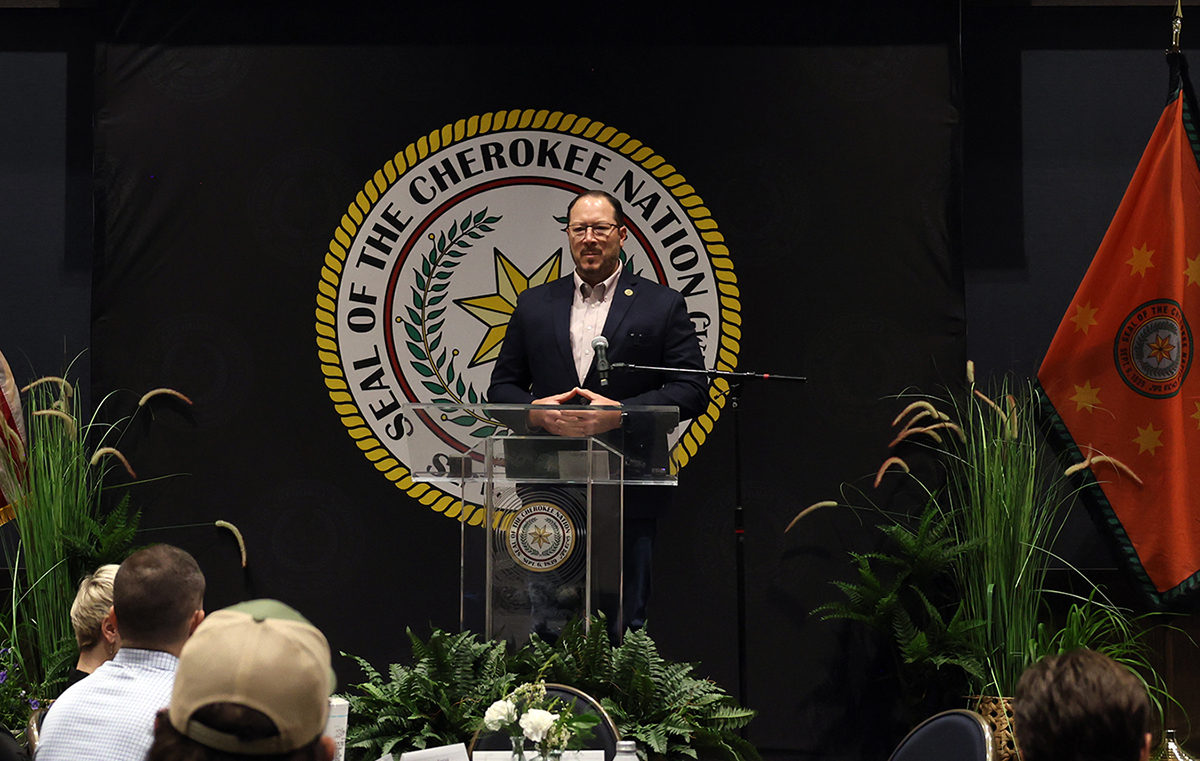TAHLEQUAH, Okla. — The Cherokee Nation held its first Agricultural Summit April 24 at the Chota Center, bringing together agricultural producers, speakers and vendors engaged in strengthening tribal food systems and economic sustainability.
The summit provided a comprehensive platform for agricultural producers to engage with experts and vendors across multiple critical domains, including policy, regenerative economies, nutrition, environmental services, education, and climate-smart agricultural practices.
“As Cherokees, we have always understood that agriculture is more than just a way of life; it is the foundation of our communities and a vital connection to our Cherokee heritage. From the smallest family garden to wide expanses of farmland, agriculture nourishes not only our bodies but also our traditions and our future,” said Cherokee Nation Principal Chief Chuck Hoskin Jr. “The Cherokee Nation is proud to stand with our farmers, ranchers, and everyone working in or impacted by this essential industry. We will continue to support agricultural efforts by supporting policies and legislation at the local, state, and federal levels that foster sustainable agricultural practices, promote conservation, and improve nutrition especially among Native peoples. We are committed to ensuring that these resources and opportunities are available for those who need them.”

The summit was funded by the United States Department of Agriculture’s Rural Energy for America Program (REAP), which provides grant funding and guaranteed loan financing to rural small businesses and agricultural producers across the nation for projects in renewable energy systems and energy efficient improvements.
“The Cherokee Nation continues to stand in support of our USDA partners. Local USDA offices, including the Farm Service Agency and the Natural Resources Conservation Service, are key services utilized by Cherokee farmers and ranchers,” said Deputy Chief Bryan Warner. “Whether it’s through assistance in response to natural disasters, programs that protect landowners’ natural resources, initiatives that improve and create wildlife habitats, or food programs that feed families and provide market stability, these USDA services provide crucial support to Indian Country.”
Cherokee Nation Natural Resources will serve agricultural producers applying for REAP through the tribe’s Rural Energy for America Program Technical Assistant Grant. The program will offer technical assistance to citizens of Cherokee Nation or other federally recognized tribes residing within the reservation, as well as virtual assistance for at-large Cherokee citizens living in rural communities.

The tribe’s goal is to increase awareness and understanding of the Rural Energy for America Program among agricultural producers within the Cherokee Nation Reservation through virtual and in-person outreach, one-on-one technical assistance, webinar, and the annual Agricultural Summit, while also aiming to increase awareness and understanding of renewable energy systems and energy efficient improvements.
Secretary of Natural Resources Christina Justice told participants during the summit that Cherokee Nation leaders continue to advocate on their behalf and defend critical funding sources that could be at risk from federal agencies in the coming months and years.
Four specific USDA grants or grant opportunities for the Cherokee Nation are currently at risk: a Conservation Internship Program grant worth nearly $600,000 has been terminated by the USDA; a $3.5 million local food purchase grant to support local farmers and improve food security among vulnerable populations has been canceled; a $106,000 conservation grant has been paused; and a $239,000 grant for expansion of the tribe’s 1839 Cherokee Meat Co., including increased processing for services to local farmers and building resiliency in the meat supply chain, has been paused. In total, these grant opportunities would have served tens of thousands of Cherokee citizens.
“Agriculture is more than an industry – it’s a reflection of our sovereignty, our values, and our future. That’s why Chief Hoskin and Deputy Chief Warner continue to advocate for critical funding sources that may be at risk at the federal level,” said Cherokee Nation Secretary of Natural Resources Christina Justice. “This summit brings together the knowledge, tools, and partnerships needed to strengthen Cherokee Nation from the ground up. We’re planting the seeds today for a stronger tomorrow.”
Along with Cherokee Nation’s administration and Natural Resources staff, participants in the tribe’s agricultural summit included the Council of the Cherokee Nation, the Rural Energy for America Program (REAP), The Euchee Butterfly Farm, the Tribal Alliance for Pollinators, the Natural Resources Conservation Service, Oklahoma State University Extension Services, The Nature Conservancy, the Bureau of Indian Affairs, Holland & Knight LLP, and a number of vendors.

